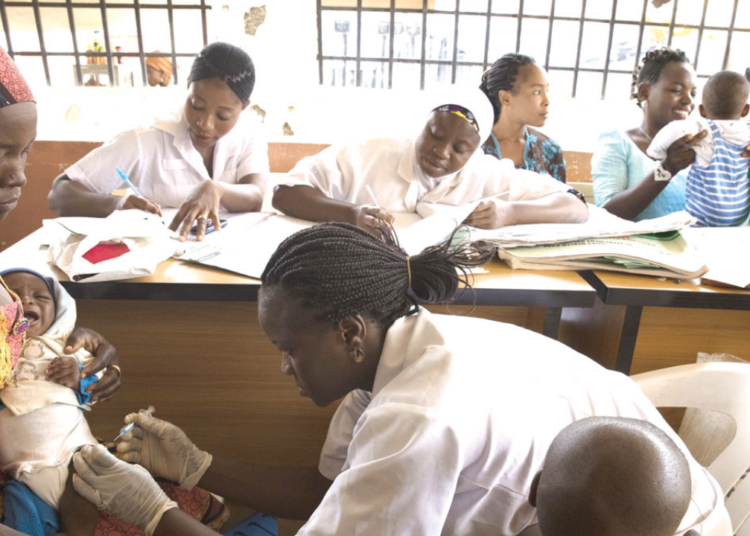The health sector in Nigeria, based on experts’ assessment, has been at a comatose level. it is not out of place to suggest that the situation has reached a point of national emergency, necessitating immediate attention, action, and reform.
Therefore, it is with a glimmer of hope that this newspaper welcomes the appointment of an accomplished global health leader, Prof Ali Muhammad Pate, as the Coordinating Minister of Health and Social Welfare.
Indeed,Prof Pate’s extensive experience in both the public and private sectors, along with his international recognition, positions him as a beacon of promise in these challenging times.
However, the road ahead for him is fraught with daunting challenges. Nigeria’s healthcare infrastructure remains severely underdeveloped, lacking the modern medical facilities that are essential for quality care.
Shockingly, in our view, the country’s healthcare indicators rank among the worst in Africa. The decay is further exacerbated by a series of critical issues.
First and foremost, Nigeria is suffering from an exodus of medical professionals seeking better opportunities abroad. The President of the Nigerian Association of Resident Doctors, Dr. Orji Innocent, sounded the alarm, when he revealed that over 2,000 members have left the country in the last two years alone.
According to him,if this trend persists, the day may come when Nigerians would wake up to find no doctors in their hospitals.
Maternal health is another deeply troubling concern. A recent report from the World Health Organization (WHO) places Nigeria as the second-highest country in the world for maternal deaths, accounting for a staggering 29 percent of the global total. This harrowing statistic paints a grim picture of the dire state of maternal care in the country.
Furthermore, neonatal and child mortality rates in Nigeria are alarmingly high, earning the nation the unenviable title of having the highest incidence globally.
In our opinion, these figures serve as a stark reminder of the urgent need to overhaul the healthcare system to protect the most vulnerable members of society.
It is an undeniable truth that the state of primary healthcare in Nigeria languishes in a deplorable state. Over the decades, the evident negligence from both state and local governments, who bear the critical responsibility of delivering primary healthcare services, has yielded an alarming deterioration in the efficiency and quality of primary healthcare throughout the nation.
The COVID-19 pandemic in 2020 exposed the shocking reality of Nigeria’s healthcare infrastructure.The then Secretary to the Government of the Federation and chairman of the presidential task force on COVID-19, Boss Mustapha, expressed disbelief at the decrepit state of the nation’s healthcare system.
“I can tell you for sure, I never knew that our entire healthcare infrastructure was in the state in which it is until I was appointed to do this work,” Mustapha admitted.
His admission underscores the urgency of the situation and the need for immediate and comprehensive reforms.
Pointedly,the allocation of funds to healthcare in Nigeria’s national budget is a matter of great concern. Despite a slight increase from the previous year, the proposed N1.179 trillion for healthcare in the 2023 budget falls far short of what is necessary to achieve Universal Health Coverage (UHC) by 2030, meet the health-related Sustainable Development Goals (SDGs), and address emerging epidemics and pandemics.
Stakeholders in the health sector have analysed the budget allocation and have determined that Nigeria is still far from meeting the recommended 15 percent allocation to healthcare as set out in the Abuja Declaration by African leaders in 2001. This failure to meet international standards highlights the pressing need for increased investment in healthcare to provide adequate and accessible services to all Nigerians.
As bad as this is, it is compounded by observable corruption in the system which often leads to diversion of available funds, misuse and abuse of facilities. Even worse is the palpable low morale on the part of personnel who feel not sufficiently motivated to give their best.
Also, part of the problem is that officials of government do not see the need to bring the health sector to the levels that are acceptable internationally. They enjoy state sponsored medical trips abroad, so, why bother?
Needless to say,Nigeria’s healthcare system stands at a critical crossroads. The appointment of Prof Pate brings hope for change, but the challenges ahead are immense. The state of healthcare infrastructure, the exodus of medical professionals, high maternal and child mortality rates, and inadequate budget allocations all demand immediate attention.
Nigeria cannot afford to ignore this crisis any longer. The health and well-being of its citizens are at stake, and the nation’s future hangs in the balance. Urgent reforms, increased investment, and a steadfast commitment to improving healthcare are not just necessary but a moral imperative. It is time for Nigeria to rise to the occasion and provide its people with the healthcare they deserve. And more importantly, discourage subsidised medical tourism.





